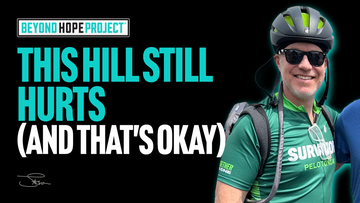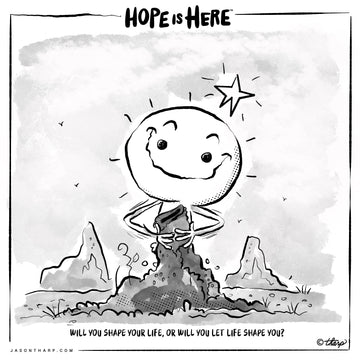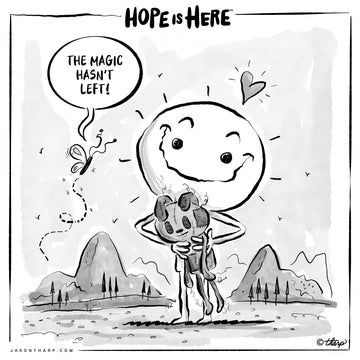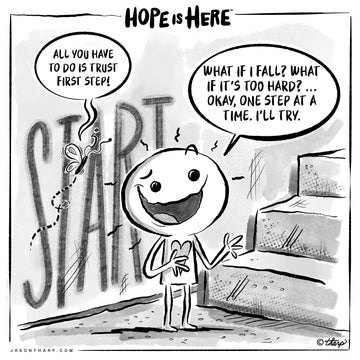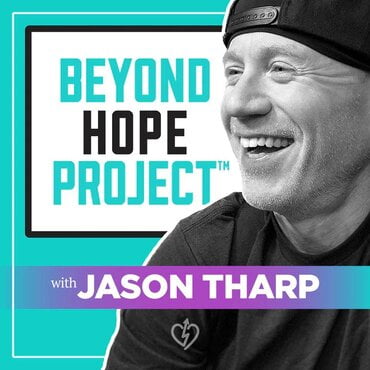The Hill That Taught Me Everything
Around Mile twelve of Pelotonia. Halfway through the ride, and my legs were kind of screaming. This seemingly endless low-grade hill stretched out in front of me like a cruel joke, and I was feeling every pedal stroke. "Man, this hill is never ending," I muttered to no one in particular.
The rider next to me, well-meaning and probably trying to encourage, shot back: "At least it's not cancer."
I pedaled in silence for a moment, processing. Then it happened again. Different rider, same hill, same casual comment from me about the difficulty. "At least it's not cancer."
Four years ago, doctors told me I had seven months to live with Grade 4 Glioblastoma. I've earned my stripes in the cancer fight. I've stared mortality in the face and somehow lived to tell about it. But here's what those well-meaning riders didn't understand: This hill still hurt. And that was okay.
The Comparison Trap
At least it's not cancer. Four words that shut down vulnerability faster than you can shift gears. Four words that, despite good intentions, create a hierarchy of suffering that serves no one.
I get it. I really do. When faced with someone's discomfort, we scramble for perspective. We reach for comparison like a life preserver, thinking we're helping someone see the bigger picture. But what we're actually doing is something far more damaging: we're teaching people that their pain only matters if it ranks high enough on some invisible scale of tragedy.
Here's what I've learned about comparison as a coping tool: it's emotional bypassing dressed up as wisdom.
When someone says "at least it's not cancer," they're not just minimizing the present struggle. They're saying that difficulty doesn't deserve acknowledgment unless it's catastrophic.
They're suggesting that having survived something terrible means you forfeit the right to find anything else challenging.
That's not hope. That's emotional imprisonment.
The H.O.P.E. Algorithm for Real Struggle
Real hope requires a different approach to difficulty:
• Hyper-Aware: Acknowledge what is without filtering it through what was. That hill was hard. My legs hurt. Those facts didn't become less true because I'd survived cancer.
• Open-Hearted: Allow space for all forms of struggle without ranking them. An open heart doesn't measure pain—it witnesses it.
• Persistent: Keep showing up to the difficulty, whether it's a cancer diagnosis or a never-ending hill. Persistence isn't about comparing struggles—it's about honoring them.
• Empowering: Give people permission to feel what they feel without needing to justify it against someone else's experience.
Why Hills Still Matter
You're allowed to find things difficult, even after surviving the biggest difficulties.
This isn't about being ungrateful or lacking perspective. This is about being human. When we create hierarchies of suffering, we rob people of their right to authentic experience. We teach them that their feelings need approval from some cosmic review board before they're valid.
I didn't survive brain cancer so I could never complain about anything again. I survived it so I could live fully—and living fully includes acknowledging when hills are hard, when days are difficult, when small struggles still sting.
The goal isn't to become immune to discomfort. The goal is to become honest about it.
Empathy Without Hierarchy
True empathy doesn't require comparison. It doesn't need to measure one person's pain against another's to determine worthiness of support. Empathy simply says: "I see that this is hard for you right now."
When someone shares their struggle, they're not asking you to rank it against global suffering. They're asking you to witness their experience. They're offering you their vulnerability, which is always a gift, regardless of the scale of the struggle.
"At least it's not cancer" might be factually accurate, but it misses the point entirely. The point isn't whether this hill compares to cancer. The point is that this hill exists, and it's challenging the person climbing it right now.
The Everyday Hills of Life
Hope isn't a passive wish—it's a strategy. And part of that strategy includes learning how to be real in the everyday hills of life, not just the mountain-sized tragedies.
Some days, the hill is cancer. Some days, the hill is a difficult conversation with your spouse. Some days, the hill is getting out of bed when depression feels heavier than gravity. Some days, the hill is literally a hill at mile twelve of a charity bike ride.
All of these hills deserve acknowledgment. None of them need permission to be difficult.
When we stop comparing struggles and start validating them, something beautiful happens. People feel seen. They feel heard. They feel human. And in that space of authentic witnessing, real healing becomes possible.
Honoring All Forms of Struggle
Impossible is optional when it comes to creating a world where people can be honest about their experience without having to justify it against someone else's pain.
You don't need to have survived cancer to find life challenging. You don't need to rank your struggles to deserve support. You don't need to minimize your experience to make room for someone else's.
Your hill is your hill. And if it's hard for you, it's hard.
The most powerful thing we can do for each other isn't to provide perspective through comparison. It's to provide presence through validation. It's to say: "I see that this is difficult for you. Tell me more about what you're experiencing."
That's where real hope lives. Not in the comparison, but in the connection.
Mile twelve taught me that surviving the biggest hill doesn't disqualify you from acknowledging the smaller ones. It qualifies you to know that all hills matter, and all hills end, and all hills deserve to be climbed with honesty about the effort they require.
This hill still hurts. And that's not just okay—it's human.
Jason Tharp is a keynote speaker, author, and brain cancer survivor known as "The Hope Guy." Through the Beyond Hope Project, he champions the overlooked by redefining possibilities through hope, community, and love. Learn more at beyondhopeproject.com and jasontharp.com.

